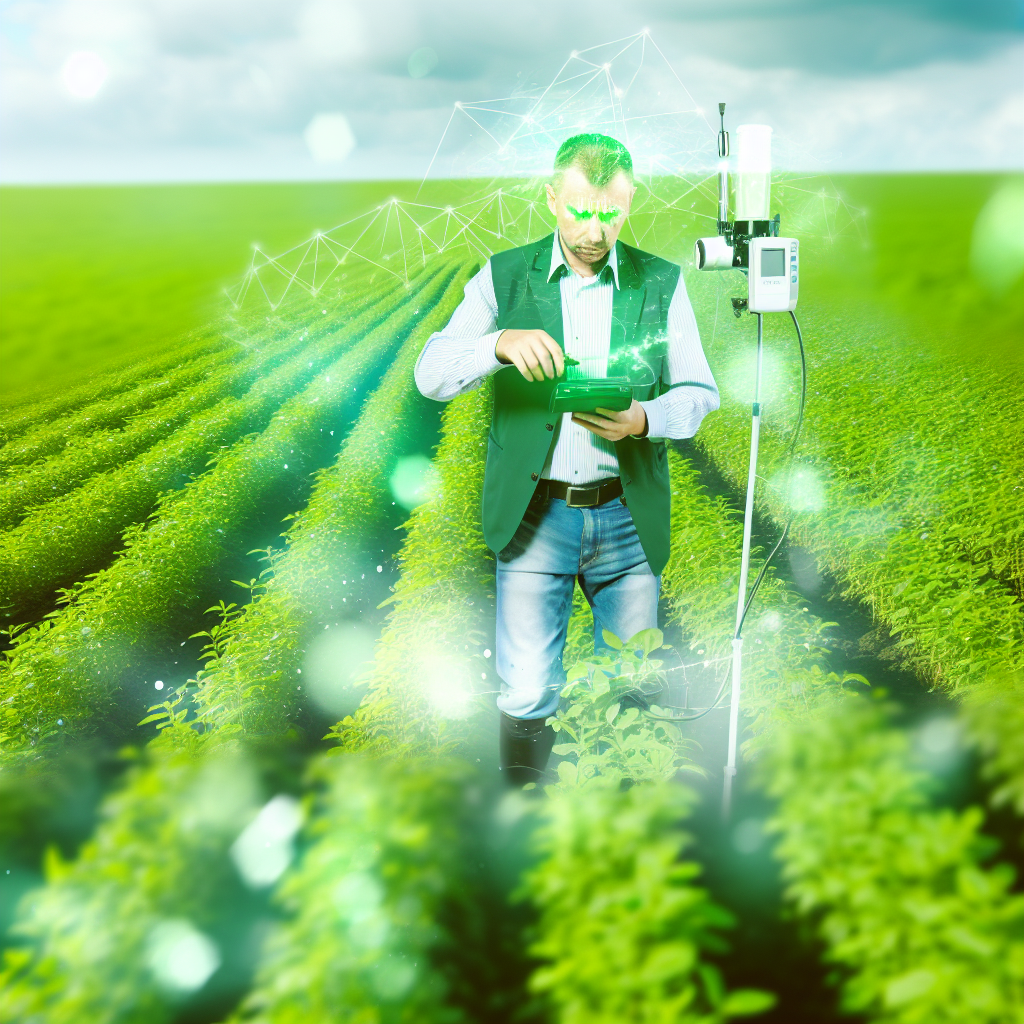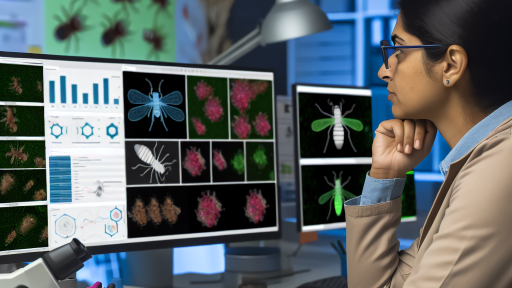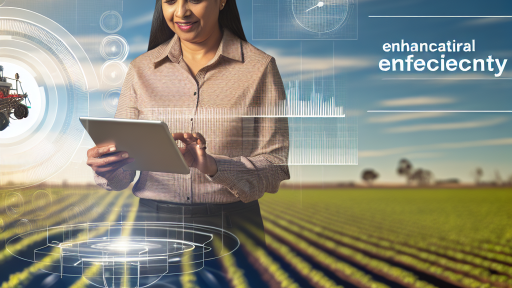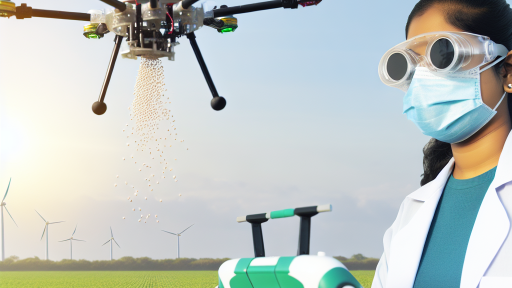Introduction to Precision Farming and Biotechnology
Defining Precision Farming
Precision farming focuses on optimizing field-level management.
It utilizes technology to monitor and manage agricultural practices.
This method enhances efficiency in crop production.
Farmers can use data analytics for informed decision-making.
As a result, resource use becomes more efficient.
Additionally, it reduces waste and maximizes yields.
The Role of Biotechnology
Biotechnology plays a crucial part in modern agriculture.
It involves manipulating organisms at a molecular level.
This manipulation leads to improved crop varieties.
Farmers use genetically modified organisms to increase resilience.
These advancements help crops withstand pests and diseases.
Furthermore, biotechnology can enhance nutritional content.
Integrating Precision Farming and Biotechnology
The combination of both fields creates significant opportunities.
Farmers can apply biotechnological innovations with precision tools.
This integration allows for targeted resource application.
Transform Your Agribusiness
Unlock your farm's potential with expert advice tailored to your needs. Get actionable steps that drive real results.
Get StartedMoreover, it enables real-time monitoring of crop health.
Consequently, farmers can make timely interventions.
This approach optimizes yield while conserving resources.
Future Implications and Opportunities
Looking ahead, precision farming will evolve further.
As technology advances, farmers will gain more insights.
Data-driven approaches will become commonplace.
Farmers will increasingly rely on comprehensive analytics.
Moreover, new biotechnological developments will emerge.
These innovations can address challenges posed by climate change.
Ultimately, the synergy between these fields will reshape agriculture.
Overview of Current Trends in Precision Agriculture
Adoption of Advanced Technologies
Farmers increasingly utilize advanced technologies in their practices.
Tools like GPS and IoT devices enhance farm management efficiency.
These technologies provide precise data for informed decision-making.
Additionally, drones enable crop monitoring and health assessment.
Farmers can apply resources more efficiently with precision agriculture.
Data-Driven Decision Making
Data analytics plays a crucial role in farming today.
Farmers collect extensive data on soil health and crop performance.
This data helps identify optimal planting times and resource allocations.
Predictive analytics further improves future yield forecasts.
Consequently, farmers can minimize waste and enhance productivity.
Sustainability and Environmental Awareness
Current farming trends emphasize sustainability and environmental responsibility.
Farmers prioritize practices that reduce chemical usage and soil degradation.
Agroecological techniques are gaining popularity in diverse farming systems.
Furthermore, cover cropping improves soil health and reduces erosion.
Showcase Your Farming Business
Publish your professional farming services profile on our blog for a one-time fee of $200 and reach a dedicated audience of farmers and agribusiness owners.
Publish Your ProfileThese practices contribute to long-term environmental sustainability.
Integration of Biotechnology
Biotechnology is transforming the landscape of precision agriculture.
Crops are genetically modified to resist pests and climate challenges.
This increases yield while reducing the need for chemical inputs.
Biopesticides and biofertilizers promote eco-friendly farming practices.
Farmers can achieve higher productivity without harming the ecosystem.
Consumer Demand for Transparency
There is a growing consumer demand for transparency in food production.
Farmers respond by providing detailed information about practices used.
Traceability in food supply chains enhances consumer trust.
This trend encourages farmers to adopt sustainable methods as well.
As a result, companies share their sourcing and production processes openly.
The Role of Genetic Engineering in Crop Improvement
Introduction to Genetic Engineering
Genetic engineering transforms agriculture by significantly enhancing crop traits.
This technology allows scientists to modify plant genomes directly.
By introducing beneficial genes, we can improve yield and resistance.
Advantages of Genetic Engineering
One major advantage is increased crop resilience to pests.
This resilience reduces the need for chemical pesticides.
Moreover, genetic engineering enhances tolerance to environmental stressors.
Crops can withstand drought, floods, and salinity more effectively.
Key Genetic Engineering Techniques
The CRISPR technology allows for precise gene editing.
This technique replaces traditional breeding methods.
Additionally, transgenic methods introduce new traits via foreign genes.
These advancements lead to faster crop improvement cycles.
Case Studies of Success
One notable example is the development of Bt cotton.
This crop produces a natural insecticide, safeguarding against pests.
Another example is drought-resistant maize developed by AgraTech.
This maize hybrid can thrive with less water, ensuring food security.
Ethical Considerations
Despite benefits, genetic engineering raises ethical concerns.
Public perception often influences regulatory approaches.
Transparency in the development process is crucial for acceptance.
Moreover, ongoing dialogue among stakeholders is essential.
The Future of Genetic Engineering in Agriculture
Looking ahead, advances will focus on precision and efficiency.
Biotechnology will enhance food production sustainably.
As technology evolves, farmers will access smarter tools.
Ultimately, genetic engineering will play a critical role in food security.
Learn More: Blockchain Technology And Its Impact On Farming Supply Chains
How Biotechnology Enhances Soil Health and Fertility
Improving Soil Microbial Communities
Biotechnology significantly enhances microbial diversity in soils.
This diversity boosts nutrient cycling and availability for crops.
For example, genetically engineered microbes can fix nitrogen more efficiently.
These innovations lead to healthier soil ecosystems that support growth.
Reducing Soil Erosion
Biotech crops often feature enhanced root structures.
Showcase Your Farming Business
Publish your professional farming services profile on our blog for a one-time fee of $200 and reach a dedicated audience of farmers and agribusiness owners.
Publish Your ProfileThese roots help stabilize the soil and prevent erosion.
By minimizing soil loss, farmers can maintain productivity over time.
Moreover, healthy soil retains moisture, benefiting crops during droughts.
Enhancing Nutrient Absorption
Biotechnology facilitates the development of crops with better nutrient uptake.
These crops can access nutrients locked in the soil more effectively.
As a result, farmers require fewer chemical fertilizers.
This practice not only saves costs but also protects the environment.
Fostering Biodiversity
Biotechnology encourages the cultivation of diverse crop varieties.
This diversity enriches the overall soil health.
Diverse cropping systems can support a wider range of beneficial organisms.
Consequently, these systems enhance resilience against pests and diseases.
Implementing Precision Agriculture Technologies
Precision agriculture leverages biotechnology to optimize soil health.
For instance, sensors monitor soil conditions in real time.
This data helps farmers apply inputs more efficiently.
These practices lead to healthier soils and improved crop yields.
Find Out More: Automated Irrigation Systems Ensuring Water Efficiency in Farming
Precision Irrigation Techniques Powered by Biotech Innovations
Advancements in Biotechnology
Recent advancements in biotechnology significantly enhance precision irrigation methods.
These innovations focus on improving water efficiency in agriculture.
For instance, biotech companies are developing drought-resistant crops.
These crops require less water without compromising yield.
Additionally, biotechnological tools help track soil moisture levels accurately.
Smart Irrigation Systems
Smart irrigation systems utilize real-time data to optimize water usage.
Sensors placed in fields provide continuous feedback on moisture levels.
This data allows farmers to adjust irrigation schedules accordingly.
Consequently, crops receive the right amount of water at the right time.
As a result, not only do these systems conserve water, but they also reduce costs.
Integration with Climate Data
Integrating biotechnology with climate data is becoming increasingly important.
Farmers can access weather predictions to plan irrigation schedules effectively.
Such integration minimizes risks associated with unpredictable weather patterns.
Furthermore, it enhances the resilience of farming operations.
Innovative Soil Management
Innovative biotech solutions also focus on soil management practices.
Microbial inoculants improve soil health and moisture retention.
Healthy soil supports healthier crops, leading to better yields.
Farmers can also use nutrient-release technologies to feed plants more efficiently.
Benefits of Precision Irrigation
Precision irrigation techniques offer numerous benefits for farmers.
They lead to increased crop productivity and better resource management.
Additionally, they contribute to environmental sustainability.
Farmers adopting these practices can reduce their water footprint.
These innovations promise a more efficient agricultural landscape in the long run.
Explore Further: Biotechnology Tools Every Modern Farmer Should Know
Showcase Your Farming Business
Publish your professional farming services profile on our blog for a one-time fee of $200 and reach a dedicated audience of farmers and agribusiness owners.
Publish Your Profile
The Impact of Biotechnology on Pest Management Strategies
Introduction to Biotechnology in Pest Management
Biotechnology revolutionizes pest management in agriculture.
This approach offers innovative solutions for farmers.
It enhances both crop protection and yield efficiency.
Development of Genetically Modified Organisms
Genetically modified organisms (GMOs) play a crucial role in pest control.
These organisms possess traits that resist pests and diseases.
Farmers employ GMOs to reduce chemical pesticide usage.
As a result, they contribute to environmental sustainability.
Biopesticides: An Eco-Friendly Alternative
Biotechnology enables the development of biopesticides.
These products originate from natural materials like plants and microbes.
Biopesticides provide targeted pest control options.
Their use minimizes the risk of harming beneficial organisms.
Precision Application Techniques
Precision agriculture technologies enhance the application of biotechnological solutions.
Farmers can use drones and sensors to monitor pest populations.
This data allows for well-timed interventions in pest control.
Consequently, farmers achieve higher efficiency and lower costs.
Collaborative Research and Development
Collaboration between biotech firms and agricultural researchers is vital.
Partnerships drive innovation and improve pest management strategies.
Moreover, shared knowledge accelerates the development of new solutions.
This synergy ultimately benefits the agricultural sector at large.
Challenges Facing Biotechnology in Pest Management
Despite its advantages, biotechnology faces challenges.
Public perception and regulatory hurdles are significant issues.
Additionally, ethical concerns regarding GMOs must be addressed.
Effectively communicating the benefits of biotechnology is essential.
Future Prospects for Pest Management
The future of pest management looks promising with biotechnology.
Continuous advancements will likely yield more resilient crops.
Furthermore, integrating biotechnology with ecological practices will enhance sustainability.
Ultimately, these strategies will help secure food production for future generations.
Discover More: Vertical Farming Technologies Driving Sustainable Urban Agriculture
Case Studies: Success Stories of Biotech in Precision Farming
The Rise of Genetically Modified Crops
Genetically modified crops have transformed agriculture significantly.
For example, the introduction of Bt corn reduced insecticide use.
This crop produces a natural insecticide, enhancing yield and profitability.
Moreover, farmers reported a 20% increase in corn production in some regions.
Innovative Microbial Solutions
Microbial solutions have gained traction in precision farming.
One notable case involves using beneficial bacteria to boost plant growth.
Agricultural Innovations Inc. developed a microbial inoculant for soybeans.
This product improved nutrient uptake and increased yields by 15%.
Farmers appreciated the reduced need for chemical fertilizers.
CRISPR Technology Enhancements
CRISPR technology represents a groundbreaking approach to crop improvement.
Agritech Solutions utilized CRISPR to enhance drought resistance in wheat.
This method allowed for faster, more precise genetic alterations.
Showcase Your Farming Business
Publish your professional farming services profile on our blog for a one-time fee of $200 and reach a dedicated audience of farmers and agribusiness owners.
Publish Your ProfileAs a result, wheat yields increased, withstanding prolonged dry spells.
Farmers expressed satisfaction with higher overall crop resilience.
Precision Irrigation and Biotech Integration
Integrating biotechnology with precision irrigation shows promising results.
Smart AgriTech implemented sensors that monitor soil moisture levels.
They paired this technology with genetically modified crops for optimal growth.
Consequently, water usage reduced by up to 30% on participating farms.
This approach not only conserves water but also maximizes crop efficiency.
Reducing Pesticide Dependency
Biotechnology plays a crucial role in reducing pesticide reliance.
Farming Innovations Ltd. introduced pest-resistant varieties of tomatoes.
These tomatoes demonstrated significant resistance to common pests.
Farmers observed a 50% decrease in pesticide application as a result.
This shift leads to healthier produce and lower environmental impact.
Future Challenges and Ethical Considerations in Agricultural Biotechnology
Technological Advancements
Biotechnology will encourage rapid technological innovations in agriculture.
However, farmers must adapt quickly to these changes.
Sustainable practices and modern technology must go hand in hand.
Stakeholders need to invest in training and education.
Environmental Impact
Biotech crops can reduce chemical usage significantly.
Yet, there are concerns about potential biodiversity loss.
Monitoring ecosystems will be essential for balanced progress.
Regular assessments can help mitigate adverse effects.
Economic Considerations
Economic viability remains a primary concern for farmers.
The cost of biotech seeds can deter small-scale farmers.
Subsidies and financial support will be crucial for accessibility.
Moreover, market acceptance of biotech products varies widely.
Ethical Concerns
Ethical issues surrounding genetic modification provoke significant debate.
Consumer trust plays a vital role in biotechnology’s success.
Transparency in labeling can help address public concerns.
Education about biotechnology benefits is essential for informed decisions.
Regulatory Framework
Governments must establish clear regulations for biotech use.
Consistent policies can foster innovation and safety.
International cooperation will enhance standards and best practices.
A comprehensive framework can alleviate conflicts and confusion.
Social Acceptance
Public perception influences biotechnology’s widespread adoption.
Efforts must focus on communication and outreach strategies.
Engaging communities can build understanding and support.
Listening to concerns will strengthen relationships with consumers.




